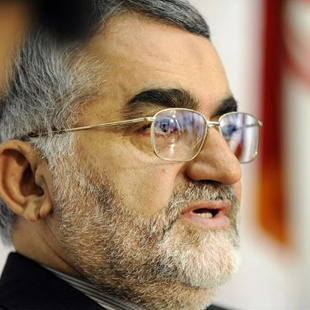The IAEA Report Has No Legal Value

 IRD: The Director General of the International Atomic Energy Agency submitted his latest report to the members of the IAEA for review at the board. Yukiya Amano has stated in this report that the Agency cannot confirm that the Iranian nuclear program is completely peaceful. This report also refers to the possible designing of “nuclear warheads” by Iran to install on its Shahab III missiles. Iranian Diplomacy discussed the reasons behind the release of this report with Alaeddin Boroujerdi, the Head of the Parliamentary National Security Commission.
IRD: The Director General of the International Atomic Energy Agency submitted his latest report to the members of the IAEA for review at the board. Yukiya Amano has stated in this report that the Agency cannot confirm that the Iranian nuclear program is completely peaceful. This report also refers to the possible designing of “nuclear warheads” by Iran to install on its Shahab III missiles. Iranian Diplomacy discussed the reasons behind the release of this report with Alaeddin Boroujerdi, the Head of the Parliamentary National Security Commission.
IRD: The IAEA says that according to a new report by the Director General it has gained more information on the possible military aspects of Iran’s nuclear program, and expresses concern over Iran’s undisclosed nuclear activities including the development of a nuclear warhead for its missiles. How important do you think this report is?
AB: The IAEA reports have always been like this. The Director General of the IAEA always includes such remarks in his reports to satisfy the US. Mr. ElBaradei’s reports had less of these remarks, but currently due to the dependency of Mr. Amano on the US, these issues have become bolder. Nevertheless, these issues are completely void of reality. Fortunately we are the only country where all its nuclear activities are entirely transparent. We have repeatedly invited inspectors and journalists to visit our nuclear facilities.
Recently, representatives from all countries were invited to visit our nuclear centers and witness in person that all our activities are within the framework of the IAEA peaceful aims and in accordance with its regulations and the NPT. Therefore, it seems that these remarks are in line with political purposes and have no legal value. The West has always used this propaganda-- which holds no legal value-- since it is not based on any document and is released based on claimed information.
IRD: What is the reason behind this media propaganda?
AB: Following Mrs. Ashton’s correspondence and Mr. Jalili’s response and the expectations of the West, which assumed Iran would continue negotiations; they feel threatened by the deadlock reached in the negotiations, especially since their strongholds in the region are collapsing one by one. Egypt, Tunisia, Libya and Yemen are all in trouble, and the US is losing its iron grip on these countries.
In addition the upcoming election in the US requires that the Americans create such an atmosphere. For example, the Bin Laden scenario was planned based on this issue and was performed with extensive propaganda. A huge wave of negative propaganda against the Islamic Republic of Iran has been created by the same token. This wave is another loop in this chain of events that Obama tries to use to compensate for the drop in his popularity in the US. The US government tries to remake Obama’s image with the vast media and propaganda opportunities they have.
IRD: How do you assess Obama’s recent remarks on Iran? Are these remarks supposed to be interpreted according to the same atmosphere?
AB: Of course, we cannot expect Obama to speak positively about Iran. I believe that the repeated failures of the US in the region, the Israeli concerns over the fall of Mubarak and their failure in conducting their plans in Syria, has created anger and dissatisfaction for the Americans. Therefore, they try to redirect attention to an issue which they can plan in accordance to their aims.
IRD: How important do you think are Obama’s remarks about the formation of a Palestinian government within the ‘67 borders and the Israeli disagreement? Can this issue be considered a major point of conflict between the US and Israel?
AB: Obama’s remarks were met with opposition from the Israeli side. There are two theories which could explain this. First is that this conflict is an important and strategic one, and the other is that this was a calculated move agreed upon by both the American and the Israeli side. Since Fatah and Hamas announced that they would take the proposal for the formation of a Palestinian state to the UN General Assembly, the US, which is not interested in leaving this leverage to turn into a UN resolution, has brought up the issue itself.
Therefore the US proposed this plan so that it could take control of the process. On the other hand, the Zionist regime will never allow such event to take place. They cannot see their security realized within this area. That’s why they opposed this plan. Anyhow, I believe that this controversy has existed the past. However since no administration in the US-- whether Republican or Democrat-- has any choice but to support the Zionist regime, and while this unconditional support for Israel is an American strategy, this controversy does not seem to be a very deep issue. In other words, the current controversy between the US and Israel is more of a tactical controversy than a strategic one.

